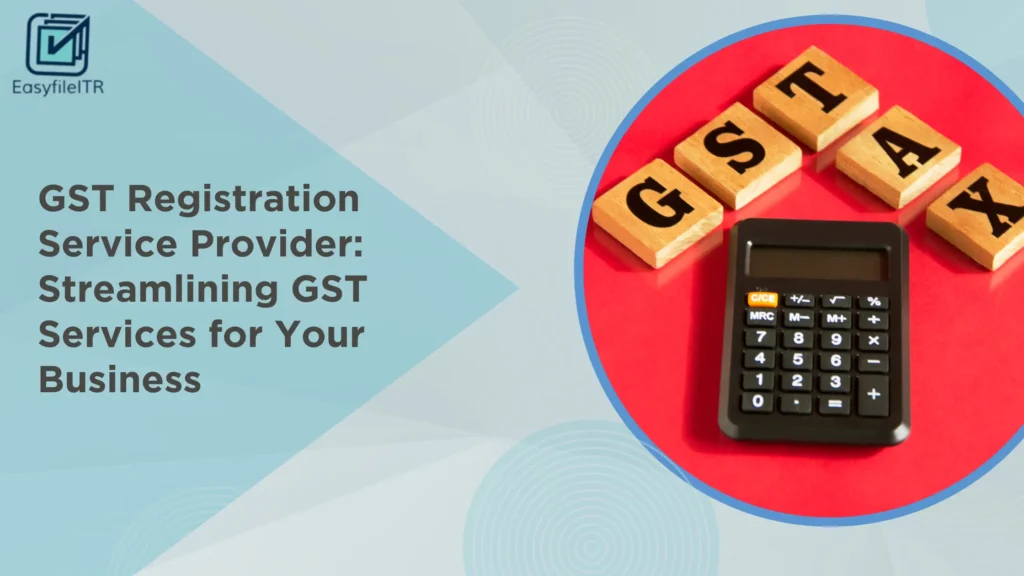
Goods and Services Tax (GST) have completely changed the country’s tax system. GST registration is now made simple so businesses can obey the rules and still remain efficient. Yet, improvements aside, facing problems during the registration process has continued to cause confusion and delays for small businesses and startups. Luckily, the government has provided new instructions to make the system simpler and clearer. Today’s blog looks into updated GST registration and how companies can make the most of professional and reliable GST services.
Why you Need to Use a GST Registration Service
As GST is implemented in India, all businesses that want to use input tax credit must first register with the authorities to ensure their firm operates smoothly. Registering for GST is compulsory for all businesses whose income is over the fixed threshold, as each type of business and location have different criteria. Even though registration is required for businesses to stay lawful, it has long been an irritant for many new entrepreneurs.
Common Issues Small Businesses Face When Registering for GST
Many small companies and startups have encountered several obstacles when signing up for GST. Many of the typical issues which have contributed to uncertainty and delays are:
Because GST officers do not always apply the same process, some applicants currently encounter discrepancies. Some people get a smooth application experience, but others have to deal with pointless refusals or delays.
- There have been occasions where officers propose irrelevant or presumptive inquiries that only make the applicant’s experience harder. Because of these delays, people can become upset.
- Often, there is confusion because the request for some documents is not on the official forms.
- Many businesses are often asked why they operate from certain places which is something unrelated to the registration process.
Important changes in GST registration explained
As a result, the government has produced a set of new rules to clear things up and make the process smoother for everyone involved. Let us discuss the fundamental points now.
1. Documentation Process Made Simple
Documentation for GST registration has been made simpler according to the updated guidelines. Depending on the business, in most cases applicants are asked to prepare a restricted set of documents.
- If your property is solely yours, evidence of ownership can be shown with just a single bill or document.
- When dealing with rented properties, a Registered Rent Agreement and Electricity bill.
- If the business is run from a shared property or a relative’s home, an applicant has to show a consent letter (affidavit consent letter on Stamp of Rs.500 ), one proof of ownership and the property owner’s identity.
- SEZ Documents: Businesses within Special Economic Zones (SEZ) have to attach the required SEZ particular documents.
2. Processing Time
The government has defined how much time it will take to process GST registration applications. There are new guidelines set out in the updated rules.
- Easy Cases: GST registration for easy applications that cause no risk is expected to be approved within seven working days.
- Flagged Cases: The system needs additional verification for cases without Aadhaar or thought to be risky, making the process take a bit longer.
3. Supervising & being accountable
For a smooth registration process, now senior officers are responsible for looking over the GST registration applications. Being sure that the staff obeys the given rules and procedures is part of the role. Authorities will punish officers who do not comply with the rules.
Explaining How a GST Service Provider Can Provide Help
The new guidelines are designed to make things clearer and help businesses feel less stressed. At the same time, it’s clear that the process of GST registration, compliance and e-invoicing may be tough for people who are new to taxation. It is here that you need a professional business providing GST services.
Exactly What Services Do GST Providers Offer?
A GST service provider support businesses with all the steps of GST, including registering and submitting returns. Their help can cover starting the company as well as regular compliance needs. GST service providers may give customers the following support:
They guide clients during registration by preparing the required papers and filing them properly.
- GST service providers make GST returns and filing on a monthly, quarterly and annual basis for your business. Among these are the filings of GSTR-1, GSTR-3B and GSTR-9.
- GST Compliance: A tax advisory service from a GST expert covers the best methods for following GST laws, plus tips for saving on taxes and making the most of input tax credit.
When e-invoicing is required for all businesses generating 5 crore or more, a GST service provider such as SecureInvent, can assist with the process by ensuring your e-invoices are created, registered on IRP and sent to the proper GST portal.
How to Send E-Invoices under GST
Adopting e-invoicing is now required by businesses whose (AATO) Aggregate annual turnover is above 5 crore. Below, I’ve outlined how e-invoicing works:
Invoice Creation: The business depends on Tally or SAP, along with any ERP system, to generate invoices.
It is required that businesses with an Aggregate Annual Turnover (AATO) higher than ₹5 crore use e-invoicing. This is how the process takes place:
1. Invoice Creation
- Depending on your software (e.g., Tally, SAP or other suitable GST-compliant tools), create invoices that are in the format required by the GST law.
- Be certain that all necessary data, including the GST identification number, invoice number and HSN codes, are correct.
2. Upload to IRP
You should report your invoice to the Invoice Registration Portal (IRP) within 30 days after issuing it.
The following documents are used in support of the application.
- Tax invoices
- Credit notes
- Debit notes
3. Receive IRN & QR Code
- When the IRP is validated, an Invoice Reference Number (IRN) and a QR code are created on the system.
- It is only when you register the incoming invoices that they become legally enforceable.
4. Share with Buyer
Give the invoice (that includes the IRN and QR code) to the buyer.
5. Post-Invoice Actions
Make note of the IRN in your accounting files for when you need it in the future.
Main compliance guidelines
- Upload your invoices within one month because submitting late will make them invalid for ITC.
- From June 1, 2025, all anomalies in case of invoice numbers are resolved by converting them to uppercase (by IRP).
Why E-Invoicing?
- Manual mistakes and disagreements in GST are greatly decreased.
- Simplifies the process of claiming input tax credit.
- It is compulsory for organizations whose AATO is ₹5 crore or more.
- Try to set up e-invoicing on your ERP/Tally system if you want to avoid problems near deadlines.
Why Should You Trust a Professional GST Service Provider?
With the many parts involved in dealing with GST, businesses may want to use a GST service provider for a smooth registration process. Engaging a professional service provider will give you certain advantages over working alone.
- Advice from Experts: GST service providers keep up with all the law updates and can lead clients through the registration and reporting process.
- By assigning GST-related work to third parties, companies lower any chance of making errors that could result in troublesome outcomes.
- Businesses can spend more time on growing and developing by putting the responsibilities of GST into the hands of experts.
- It saves money over time: While you pay for a GST service provider, you will avoid penalties and stay in compliance.
Conclusion
Simplifying the GST registration process is a good move for businesses, both small firms and startups. Even so, GST compliance involves steps that need specialists to do them properly. A GST service provider guarantees that a business is following the rules while enjoying the benefits of the GST. With the support of GST experts, businesses have more time to work on their key activities while being sure their taxes are taken care of correctly.
Frequently Asked Questions About GST Registration Services
Who needs GST registration for their business?
Any business with a turnover above ₹40 lakhs (₹20 lakhs for special category states) must register under GST. If you deal in inter-state sales, online selling, or provide services, you may need GST registration for businesses even below that limit.
What is the GST registration process?
The GST registration process involves submitting an online application on the GST portal with required documents such as PAN, Aadhaar, business proof, and bank details. A GST consultant in India can help ensure smooth processing and faster approval.
How long does online GST registration take?
Typically, online GST registration is completed in 3 to 7 working days if the documents are accurate and verification is successful.
What are the benefits of hiring a GST registration service provider?
A professional GST registration service provider helps avoid delays, rejections, and errors. They guide you through the paperwork, follow up on application status, and ensure full GST compliance for your business.

